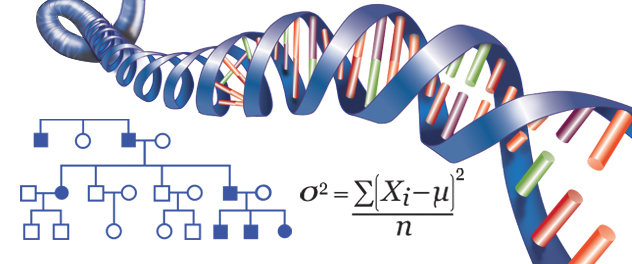 Decoding genetics
Decoding genetics
Our lab develops, applies, and distributes new statistical methods and user-friendly software to help unravel the complex genetic basis of common human diseases and traits.
Overview
The complex genetic basis of common human diseases and traits necessitates the development of new statistical methods to address new questions and new data emerging from ongoing and cutting-edge research.
The Statistical Genetics and Genetic Epidemiology Laboratory of Daniel J. Schaid, Ph.D., at Mayo Clinic designs studies, analyzes data, and develops computational and evaluation methods for genetic data generated by researchers. The methodology and software developed and distributed by our research team have wide application to biomedical research, with emphasis on different types of omics data.
Areas of interest
Our specific areas of research interest include:
- Family-based genetic epidemiology studies. These include aggregation of diseases in families, analysis of quantitative traits and genetic linkage studies.
- Genetic association studies of common diseases. These include breast cancer, prostate cancer and cardiovascular diseases and their quantitative intermediate traits.
- Design and analysis methods for DNA and RNA sequence variation studies.
- Using genomic data to predict disease occurrence or response to therapy.
- Integrating different types of omics data. These include DNA sequence variation, gene expression, proteomics and metabolomics.
About Dr. Schaid
Dr. Schaid is the Curtis L. Carlson Professor of Genomics Research and chair of the Department of Quantitative Health Sciences. He also is a professor of biostatistics at Mayo Clinic College of Medicine and Science in Rochester, Minnesota. Dr. Schaid has been actively researching statistical methods for genetic studies since 1993 and has collaborated on a broad range of human genetic studies.
Dr. Schaid received a master's degree in human genetics in 1981 and a doctoral degree in biostatistics in 1986, both from the University of Pittsburgh. After working in cancer clinical trials and genetic studies from 1986 to 1992 at Mayo Clinic, he was sponsored by Mayo Clinic as a Mayo Scholar from 1992 to 1993 to work on statistical genetics problems with distinguished statistical geneticist Robert C. Elston, Ph.D., then at Louisiana State University Medical Center.
As principal investigator of the Statistical Genetics and Genetic Epidemiology Lab, Dr. Schaid focuses on methods to track down genes that increase risk of disease and improve how patients respond to therapies for a variety of conditions.